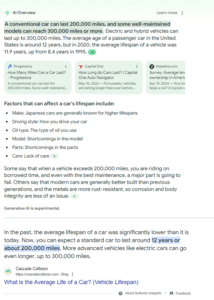How Google’s AI Overview is Potentially Reshaping Search Engine Optimization

Earlier this month, Google started rolling out its AI Overview feature (formerly known as Search Generative Experience) to search results in the United States. While so far the experience has been less than stellar (and sometimes flat out incorrect), many in the digital marketing industry fear that Google has finally killed SEO once and for all. But is that true? Or is it an opportunity for marketers who are willing to adapt?
First, a brief history of Google & AI
Google’s journey with AI began earnestly in 2015, with the introduction of RankBrain. RankBrain was an AI system designed to help process search results and provide more relevant responses to user queries. This was followed by the introduction of the Bidirectional Encoder Representations from Transformers (BERT) in 2019, which allowed Google to understand the context of words in search queries better.
Introducing the Search Generative Experience (SGE)
The Search Generative Experience (SGE) represents Google’s most ambitious effort to date in leveraging AI for search. Unlike traditional search algorithms that primarily rely on keyword matching, SGE uses advanced AI techniques to understand the nuances of human language and intent.
In May 2024 SGE was renamed AI Overview and moved from Google Labs into general search engine results pages.

As seen in the example above, a search for “how long does a car last” displays the AI generated answer and several sources. You likely also noticed that the AI Overview does not display any ads. But fear not – Google will be including ads in AI Overview soon!
Something else to note in the above example is that the featured snippet still appears, providing a quick and convenient answer to the query directly below the AI-generated answer. And while the two answers above are generally in agreement, there have been at least some queries in which the AI answer differed from the featured snippet.
This raises a few different questions:
- Will seeing two different answers affect user confidence in Google’s AI results?
- Will Google replace Featured Snippets entirely in favor of AI?
The answer to both questions remains to be seen, but depending on how Google handles this, it could have a direct impact on SEO strategy.
How will AI Overview Affect SEO?
If you listen to the doom and gloomers (who apparently forget that SEO has been declared dead dozens of times over the past two decades), AI Overview has already killed SEO and we should all be looking for new careers.
Obviously, Arc doesn’t share this sentiment. First, consider that some expressed a similar concern about Featured Snippets when they were first introduced. The fear was that by providing the answer in the SERPs, Featured Snippets would give rise to “No Click Searches” in which a user gets the answer they need without ever visiting a website. However, many studies since then have shown that Featured Snippets increase visibility, and can increase click-through-rates, particularly with better qualified traffic.
And Google is so far claiming that the AI Overview is leading to increased clicks for sites, just like what is frequently seen with Featured Snippets. Though they do admit that “it may undercut low-value content.”
Of course, whether AI helps or hurts your site depends on your SEO strategy.
As AI prioritizes contextual understanding and user intent, traditional SEO strategies focused solely on keywords may become less effective. Content creators and marketers will need to adapt by producing high-quality, contextually rich content that aligns with user intent. Semantic SEO, which focuses on the meaning and topics rather than just keywords, will become increasingly important.
Structured data will play a crucial role in helping search engines understand and index content more effectively. Implementing schema markup can improve the chances of content being featured in rich snippets and other interactive elements generated by AI.
Conclusion
Ultimately, it’s still too early to know the full impact of Google’s AI Overview on SEO. And it should also be noted that like with other Google updates, the AI Overview we see today may look drastically different in the not too distant future. Still, this is far from the SEO killer some make it out to be. A successful digital marketing strategy still requires a real, live human at the helm.
For those willing to adapt, AI Overview is another opportunity for SEO professionals to help clients reach their target audience. If you’re concerned about your strategy, contact us.


